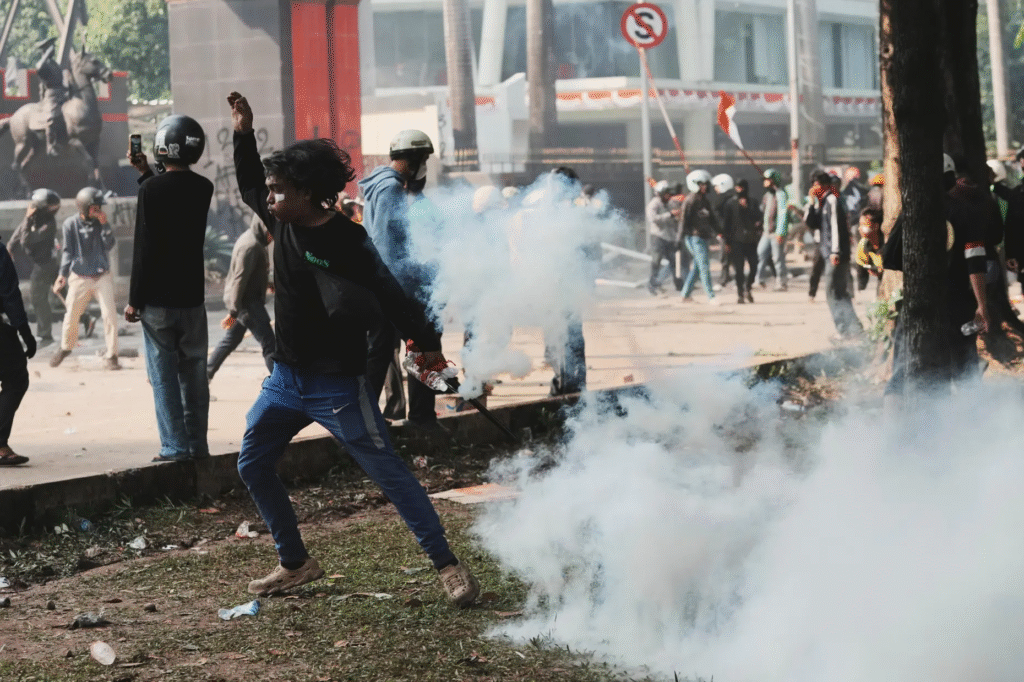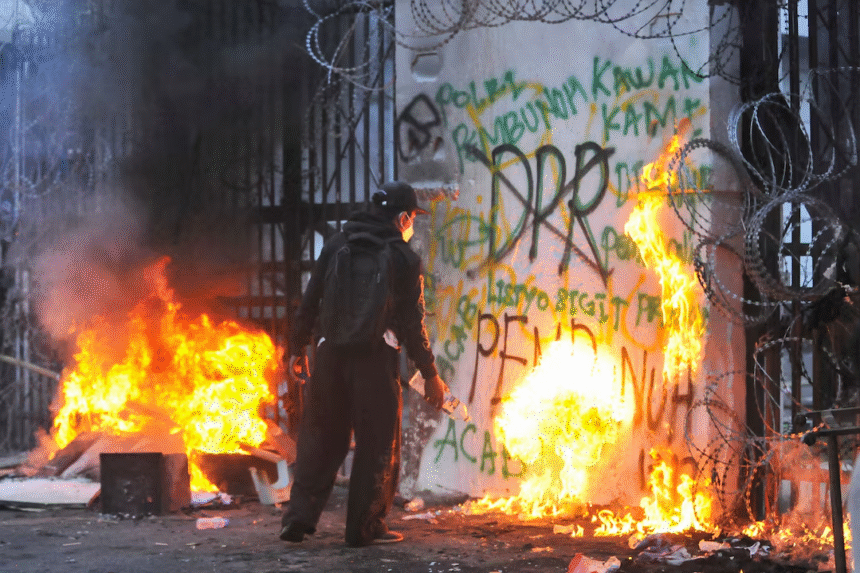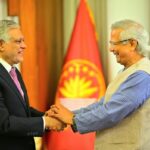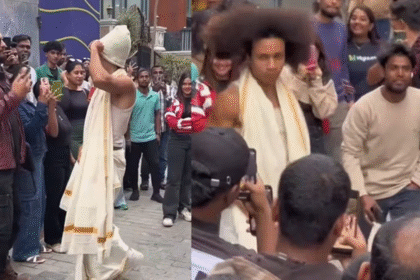Indonesia Police Fire Tear Gas Near Universities as Protests Escalate: Thousands Rally Amid Growing Tensions
Indonesia protests escalate as police fire tear gas near major campuses. Thousands of students rally against rising tensions, sparking nationwide concern
BANDUNG, Indonesia, Sept 2 (Reuters) – Indonesian police fired tear gas into crowds of protesters near two universities in the major regional city of Bandung, student groups and authorities said on Tuesday, raising tensions around demonstrations that have killed eight since last week.
The protests began in the capital Jakarta, targeting government spending such as enhanced perks for lawmakers, and have since spread nationwide. They escalated into rioting and looting after a police vehicle hit and killed a motorcycle taxi driver, causing millions of dollars of damage in the capital.
Authorities fired tear gas into crowds near the campuses of the Islamic University of Bandung, or UNISBA, and nearby Pasundan University, more than 140 km (87 miles) from Jakarta, student groups at the two institutions said on Instagram.

Pasundan student Yoga Tadiyalaga Ruchiyat said students were angry over the incident.
“The educational ground is neutral, a safe zone,” he said.
University students have long been regarded as vanguards of Indonesia’s democracy, having taken a leading role in protests that helped topple authoritarian leader President Suharto in 1998.
Police official Hendra Rochmawan said authorities did not enter the campuses but tried to break up crowds of non-student protesters seeking protection within the grounds, as crowds blocked roads in the area.
UNISBA Rector Harits Nu’man echoed the police statement, saying the campus served as a medical hub for protesters.
The UNISBA student body accused security forces of seeking to silence dissent, saying they “brutally attacked” the campus with tear gas.
President Prabowo Subianto, a military leader under Suharto, met labour unions, some of whom joined last week’s protest for a hike in the minimum wage, and said he told lawmakers to discuss labour laws, according to a statement from his office.

The head of the Indonesia Trade Union Confederation, Said Iqbal, told a press conference he had informed Prabowo of workers’ demands, such as an end to cheap labour, job outsourcing and income-tax cuts.
Prabowo has warned the police and military would stand firm against violent escalations. Jakarta police say they have detained over 1,200 people since the protests broke out, with city officials reporting $3.4 million in damage.
At least eight people have died in the protests, senior minister Airlangga Hartarto said on Monday.
Analysts say the protests test Prabowo’s young presidency, which nears its first anniversary in October.
Growing inequality among Indonesians contributed to the rising protests, said Achmad Sukarsono, associate director at consultancy Control Risks, citing a recent allowance for lawmakers that stoked public resentment.
“The growing gap between the rich and poor in Indonesia provides an easily combustible dry-hay situation. Policies that fail to consider social sensitivities like the perks for parliamentarians then turn into matchsticks,” he said.
International rights groups have criticised the security response.
“The Indonesian authorities acted irresponsibly by treating the protests as acts of treason or terrorism,” said Meenakshi Ganguly, the deputy Asia director of Human Rights Watch.
The United Nations’ rights office called for accusations of rights violations by security forces to be investigated.
Jakarta police said they had arrested the director of non-profit legal aid group Lokataru Foundation, Delpedro Marhaen, over accusations of inciting a riot among underage children.
The group did not immediately respond to a request for comment but it has said the arrest was unlawful.
Indonesians added pink and green hues to their pictures in profiles on social media in response to the protests, with some using the hashtag #ResetIndonesia and listing 25 demands for the government, including the end of police brutality and ensuring decent wages for the public.

Indonesia witnessed a surge in unrest on Tuesday as police fired tear gas near several university campuses to disperse crowds of protesting students. The demonstrations, which have rapidly escalated over the past week, highlight growing frustrations among youth over rising economic pressures, governance issues, and contentious government policies. What began as a localized student movement has now swelled into a nationwide protest wave that authorities are struggling to contain.
The latest protests erupted near prominent university campuses in Jakarta, Bandung, and Yogyakarta. Students took to the streets demanding greater accountability from the government and voicing anger over alleged corruption, economic inequality, and recently proposed political reforms. Thousands of young Indonesians marched with banners, chanting slogans for justice and transparency.
As the demonstrations intensified, clashes broke out between protesters and law enforcement. In Jakarta, large groups of students attempted to block major roads leading to government buildings, prompting riot police to intervene. Officers responded with tear gas, rubber bullets, and water cannons in an effort to disperse the crowds.
According to eyewitnesses, the situation turned chaotic when police forces advanced toward university gates where hundreds of students had gathered. Videos circulating on social media showed students scattering as thick plumes of tear gas engulfed the area. Some protesters were seen helping peers who had collapsed due to suffocation and eye irritation.
Human rights groups have criticized the police for what they describe as an “excessive and disproportionate use of force.” Several students were reportedly injured during the clashes, while dozens were detained. Police officials, however, defended their actions, claiming that some protesters had turned violent, throwing stones and damaging property.
Analysts suggest that the protests are not driven by a single issue but rather a convergence of grievances that have been building up over time. Among the key issues fueling anger are:
Rising Cost of Living – Indonesia has faced inflationary pressures in recent months, making food, fuel, and basic necessities increasingly unaffordable for the working class.
Corruption Allegations – High-profile corruption scandals involving political leaders have eroded public trust in institutions.
Political Reforms – Proposed amendments to the constitution and electoral system are seen by critics as an attempt to consolidate power and weaken democracy.
Youth Discontent – With high unemployment and limited opportunities, students and young people feel increasingly alienated from the political process.
Universities in Indonesia have historically been hubs of political activism. Student movements played a crucial role in the fall of Suharto’s authoritarian regime in 1998, and once again, campuses are becoming rallying points for dissent.
Student leaders have emphasized that the protests are peaceful and are aimed at pushing for systemic change. “We are not here to cause chaos,” one student leader in Yogyakarta told reporters. “We are here because we want a better future, free from corruption and economic hardship.”
The Indonesian government has appealed for calm, urging students to end demonstrations and return to dialogue. Officials have promised to review some of the contentious policies but have also warned that violence and vandalism will not be tolerated.
Public opinion, however, appears divided. While many Indonesians sympathize with the students’ demands and frustrations, others fear that prolonged unrest could destabilize the economy and deter investment at a time when Indonesia is working to recover from the global downturn.
The protests have gained significant traction online, with hashtags related to the demonstrations trending across Indonesia. Videos of students clashing with riot police have gone viral, sparking debates over police brutality and government accountability. Digital activism is now amplifying the voices of protesters, ensuring that the unrest is not confined to the streets but also reaches a global audience.
International human rights organizations have expressed concern over the police response, urging authorities to exercise restraint and uphold democratic freedoms. Some foreign embassies have issued travel advisories, cautioning citizens to avoid protest hotspots in Jakarta and other major cities.
Observers warn that if the government fails to address the root causes of discontent, Indonesia could see a prolonged period of instability. The unrest also poses a test for the country’s democratic institutions, which are being scrutinized for how they handle dissent.
The coming weeks will be critical for Indonesia as the government decides whether to engage in meaningful dialogue with student leaders or continue with hardline measures. Political analysts argue that ignoring the protesters’ grievances could further radicalize the movement, while open engagement could help ease tensions.
For the students, the protests represent more than just opposition to specific policies—they embody a generational demand for accountability, transparency, and opportunity. Their willingness to challenge authority signals a renewed spirit of civic engagement in Indonesia’s democracy.
Read Also : Japanese Man ‘Fined’ ₹1,000 in Gurgaon Sparks Internet Outrage, Police Clarifies Amid Bribe Allegations








